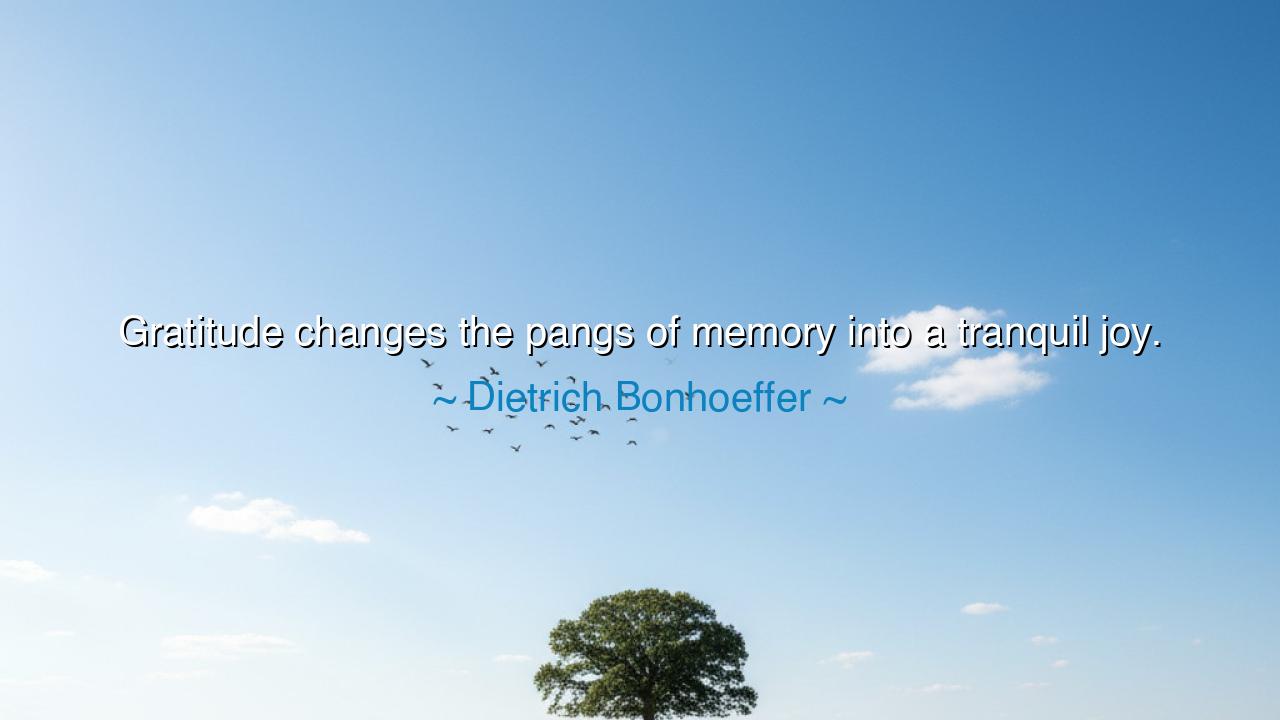
Gratitude changes the pangs of memory into a tranquil joy.






Dietrich Bonhoeffer, the martyr-theologian who bore witness in the face of tyranny, spoke with piercing clarity when he declared: “Gratitude changes the pangs of memory into a tranquil joy.” These words, born of a soul tested by suffering and persecution, reveal the alchemy of thanksgiving—the power to transfigure pain into peace, and sorrow into gentle gladness. For memories, especially those shadowed by loss, often stab the heart with grief. Yet when viewed through the lens of gratitude, they cease to wound and instead become consolations, radiant with meaning.
The pangs of memory are the sharp reminders of what we once had but no longer hold: loved ones who have passed, days of youth now gone, opportunities lost. Left unhealed, such memories torment us. They call forth regret, bitterness, or despair. But Bonhoeffer, who wrote from a prison cell awaiting execution, understood that memory itself can be redeemed. By giving thanks for what once was, by seeing each memory not as something stolen but as something given, the pang turns to peace, and grief is softened into gratitude.
Gratitude, then, is the healing balm of remembrance. It does not deny pain, nor pretend loss is not real. Rather, it acknowledges the hurt while lifting the soul to thankfulness for the gift that once blessed us. To recall a friend and weep is natural; but to recall a friend and give thanks for the joy of their companionship, even if brief, is to transform the memory into a fountain of quiet joy. Bonhoeffer’s words call us to this higher way of remembering.
History offers luminous examples. Consider Corrie ten Boom, survivor of the concentration camps. She lost her sister Betsie to cruelty and starvation, yet she spoke not only of her sorrow but of her gratitude—gratitude for Betsie’s faith, her words of hope, her example of love in the midst of horror. The memory that might have crushed her instead became her strength, because gratitude changed the pang into joy. She went on to speak worldwide, carrying Betsie’s light to generations that followed.
Even in ordinary lives, this transformation can be seen. A parent grieving the passing of a child may at first feel only unbearable loss. Yet with time and thanksgiving, the same memories that once pierced the heart become treasures—stories told with warmth, laughter mingling with tears. The pain is not erased, but gratitude redeems it, turning remembrance into a sacred joy.
The lesson for us is clear: do not fear your memories, even the painful ones. Face them with gratitude. Thank God for the love, the experiences, the moments that shaped you. See not only what was taken but what was given. In this way, you will no longer be haunted by the past, but comforted by it, walking in peace rather than sorrow.
Practically, this means making gratitude a discipline of memory. When recalling a lost friend, give thanks aloud for the moments you shared. When looking back on hard seasons, thank God for the lessons they taught, the strength they produced, the faith they deepened. Keep a journal of blessings from the past, so that remembrance is anchored not in loss but in thanksgiving.
Thus, Bonhoeffer’s words shine across the ages: gratitude is the power that transforms the pangs of memory into tranquil joy. It is the secret by which the past is not our prison, but our treasure. Let us then cultivate grateful remembrance, so that even our sorrows may be crowned with peace, and our memories may sing with joy.






AAdministratorAdministrator
Welcome, honored guests. Please leave a comment, we will respond soon